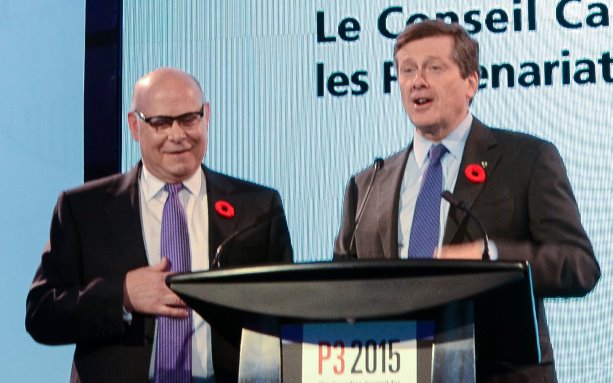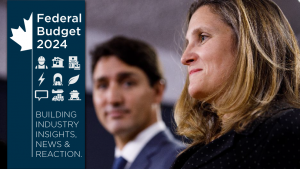Toronto mayor John Tory said a recent business mission to London, England sent a strong signal about the value of private sector ingenuity to fund and build major transit infrastructure projects.
"I wanted to see with my own eyes their infrastructure and their approach because I knew that it could help to inform my vision for the city and what we’re trying to build here," he told members of the audience in his address at the 23rd annual Canadian Council for Public-Private Partnerships (CCPPP) national conference.
"In London they are not afraid of a robust role of the private sector and neither am I," he stated, adding the perception of P3s (public-private partnerships) still needs to be addressed.
"It cannot be a matter of ideology. It is a matter of efficiency. It is matter of practicality. It is a matter of accountability."
During his London trip, Tory visited a construction site for London’s Crossrail, which he states has many parallels to SmartTrack. He also explored the Canary Wharf business district.
"These infrastructure projects all involve, without exception, a substantial role for the private sector. It’s just not a question or a debate," he explained. "It’s almost seen as a necessity to getting these things done."
The Crossrail is Europe’s largest construction project, a website dedicated to the project reads and is slated to "transform rail transport" in London and the south east, increasing central London rail capacity by 10 per cent. The route will run over 100 kilometres from Reading and Heathrow in the west, through new tunnels under central London to Shenfield and Abbey Wood in the east. There will be 40 Crossrail stations. The total funding available for the project is £14.8 billion or about $23 billion.
Tory mentioned how the Canary Wharf Crossrail station was designed and built by the private sector, costing $300 million less than was originally thought.
Toronto’s mayor believes there needs to be "a change in the culture of government" as in some instances publicly-run projects can end up costing more with delays and overruns. He mentioned the Union Station revitalization and Spadina subway projects as examples.
"These projects that have run billions of dollars over budget in total and years late, all have common characteristics," he said.
Governments have been guilty of changing the scope of projects, adding demands, low-balling the price estimate for "political purposes to get things approved."
"Sometimes it suited somebody’s political agenda," he added. "Bad contracts have been signed – contracts that failed to protect the city from risk. It’s costing us money. It’s causing us to fall further behind on infrastructure that must be built."
And, most importantly, it’s causing the public to lose faith in government, he said. Thus, all avenues need to be explored when it comes to funding models and project delivery.
A recent example is Toronto City Council’s decision to proceed with a P3 to fund the Gardiner Expressway rehabilitation.
"The procurement approach we’ve chosen to take now will reduce the time it takes to reconstruct the Gardiner Expressway. It’s going to be six years instead of 20," he said and will save around $500-million over the life of the contract. The entire estimated cost for the Gardiner is $3.8 billion over 30 years.
When it comes to future projects, such as Tory’s SmartTrack and the Scarborough subway extension, Toronto’s mayor stated all avenues will be explored.
"I will not be going forward with any of these projects without examining the option of doing them as a P3. I think it’s irresponsible not to consider that option," he said, adding it’s time to "put everything on the table."
Former Canadian deputy prime minister John Manley, who is also the honorary chair of CCPPP, shared similar views that government should tap into the private sector whenever it can.
"We’ll need governments at all levels, working closely with the private sector, to effectively address today’s infrastructure challenges," he said. "P3s are not a panacea, but when done for the right reasons they can produce some incredible social and economic results."











Recent Comments
comments for this post are closed